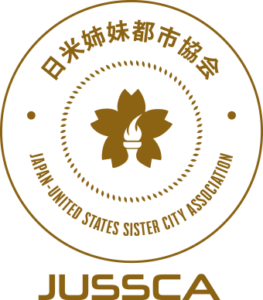History
The sister city program was instituted in the United States on September 11, 1956 at the White House Conference when then U.S. President Dwight D. Eisenhower proposed a national citizen diplomacy initiative. The first sister city relationship between a U.S. city and a Japanese city had been established just one year prior in 1955 between the City of St. Paul, Minnesota and the City of Nagasaki, Japan. This was followed by sister city partnerships between the cities of Sendai and Riverside, California in March, 1957, the cities of Okayama and San Jose, California in May, 1957, and the cities of Yokohama and San Diego, California in October, 1957. Today, over 450 sister city/town and state/prefectural relationships exist, representing the world’s largest and oldest such partnerships for both Japan and the United States.

The benefits of these sister city ties are not limited to the local or state level, but extend from these grassroots to the highest levels of the United States-Japan relationship. Sister city partnerships are a powerful leadership development tool. United States-Japan sister city partnerships tend to have a focus on student exchange. As a basis for bilateral goodwill, sister city relationships produce support for policies of engagement and collaboration between the United States and Japan. Sister city partnerships follow in the legacy of President Eisenhower’s “people-to-people” program as a platform for public diplomacy.

Sister city relationships in the United States are mostly volunteer-led or otherwise privately organized and funded. For their Japanese partners though, sister city relationships are typically run by the municipal governments’ international relations departments, and receive direct public support.
According to reports by Japan’s Council for Local Authorities for International Relations (CLAIR), a foundation that supports the internationalization efforts of the country’s local governments, in some cities international relations budgets have been cut by 50 percent, with sister city activities being cut accordingly. Where this is the case, some are moving the sister city partnership management to a self-supporting association model, but private fundraising is largely undeveloped.
In 2025, the U.S. and Japan will celebrate the 70th anniversary of its first sister city partnership.

JUSSCA Mission
Japan-United States Sister City Association (JUSSCA) is a Japanese nonprofit association based in Tokyo, Japan. The mission of JUSSCA is to cultivate and revitalize existing sister city partnerships through people-to-people exchanges.
JUSSCA Goals
With support from governments, corporations and individual partners and members, JUSSCA aims to provide sponsorships and funding to Japanese local sectors, especially smaller cities/towns and prefectures with their existing American sister city partners for Japan-U.S. sister city and state/prefectural programs.

JUSSCA Activities
Sponsorships
JUSSCA partners primarily with Japanese organizations to create strategic partnerships that administer and create funds for the sponsorship of Japan-U.S. sister city / prefectural programs.
Grants
JUSSCA applies for American and Japanese government grants to administer and distribute the funds to sponsor Japan-U.S. sister city and prefectural programs.
Memberships
JUSSCA’s individual and corporate memberships help to fund the organization’s operations and the resources and sponsorship it provides Japan-United States sister city and prefectural programs.
Partnerships
JUSSCA partners with Japanese and American embassies and consulates, Japan-America Societies in Japan, business, cultural, educational and sports organizations, and national organizations of governors and mayors in Japan. The purpose of these partnerships is to coordinate with Japanese local governments and sister city organizations throughout Japan to develop Japan-U.S. sister city and state/prefectural networks.
Applications
JUSSCA accepts applications from Japanese local governments and sister city organizations in Japan that wish to receive micro-grants to implement grassroot sister city or prefectural programs with their American sister city partners.
Who we work with
JUSSCA benefits both existing American and Japanese sister city communities by providing international assistance and resources to Japanese subnational governments and nonprofit organizations in Japan to cultivate people-to-people grassroot exchanges for diplomatic, cultural, educational, sports and economic purposes.
